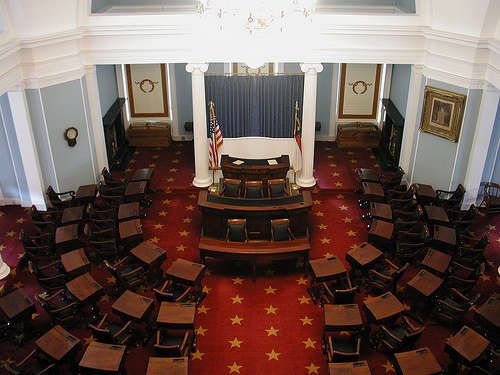North Carolina legislators have introduced a proposal that would require their state to examine national Common Core education standards. Over the last few years, North Carolina and 44 other states signed on to the Common Core, a list detailing what children should know in math and English for grades K-12. About a dozen states are now taking a second look, as policymakers and citizens raise concerns.
The proposed legislation “would authorize lawmakers to create a study committee that would ask questions [about the Common Core] that have not been answered to anyone’s satisfaction,” said Terry Stoops, director of education studies at the John Locke Foundation. These questions include, “Are Common Core standards quality standards? How much will it cost to implement common standards and tests? How do teachers and school-based administrators feel about Common Core?” and others, Stoops said.
State’s Rights
One of the major critiques of Common Core is that it is not “state-led” but rather an attempt to centralize control of standards and curriculum. Many North Carolina leaders believe this, Stoops said.
“Others are convinced that common standards and tests will propel North Carolina’s public schools into the upper echelons of international academic stardom,” he said.
Rep. Hugh Blackwell (R-Valdese), who is sponsoring the proposal, says he introduced it because “it is important to preserve North Carolina’s rights and prerogatives in determining education policy. Education policy should not be ceded to the federal government nor to some sort of pseudo-national organization.”
Common Core was sponsored by the National Governors Association and Council of Chief State School Officers, both private lobbying associations in Washington, DC.
Moving to Common Core “removes local control of curriculum away from parents, teachers, administrators, and the school board,” said Elizabeth Lankford, a North Carolina mother.
Other Considerations
The cost of implementing the standards is another concern. Lankford says expenses would total $576 million for North Carolina. She also questions the standards’ quality.
“I do not believe that it is responsible to use students as guinea pigs,” Lankford said. “The Common Core Standards are untested and unproven. There are members of the validation committee who refused to sign off on the Common Core State Standards. From what I’ve read, these people feel that the standards are not the rigorous ones promised.”
She says some of Common Core’s shortcomings include “reduced amounts of literature in favor of informational texts, not teaching conversion of fractions to decimals, and delaying the teaching of algebra.”
Blackwell says his proposal has a good chance of passing. Stoops says there is solid support for it but no guarantee.
“The anti-Common Core movement in North Carolina is not as organized as it is in other states in the region,” he notes. However, he said, if legislators fail to approve this “relatively innocuous” proposal “they will anger an active and growing constituency of Common Core opponents in our state.”
Image by Government & Heritage Library, State Library of NC.




